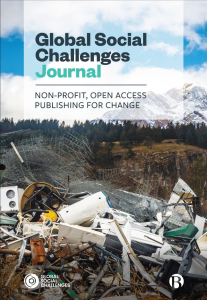There is growing recognition that the effects of climate change are mediated by global inequalities. But climate change has also been brought about through the colonial processes implicated in the production and reproduction of those very inequalities.
In early 2022, over 30 years after the Intergovernmental Panel on Climate Change (IPCC) released its first report on the challenges posed by climate change and four subsequent Assessment Reports later, the word ‘colonialism’ finally entered its official lexicon. The sixth report on ‘Impacts, Adaptation and Vulnerability’ references colonialism, not only as a historic driver of the climate crisis, but also as something that continues to exacerbate the vulnerabilities of communities to it.
This comes in the wake of longstanding arguments made by Indigenous groups and others on the frontline of climate change about the centrality of colonialism to comprehending and responding to the crisis. The last decade has also seen a significant increase in scholarly literature that draws explicit links between colonialism and climate change, but while formal acknowledgement of this relationship is long overdue, we argue for caution and precision in the invocation of colonialism within these debates.
We argue that colonialism needs to be understood as more than a metaphor in climate change debates.
The language of colonialism is increasingly invoked to describe a variety of acts of domination and control associated with the injustices produced by climate change and responses to it. It is often employed as a catch-all description for a host of acts of violence, dispossession, control and cognitive injustices. For example, ‘colonialism’ is invoked as a metaphor for expansionism (occupying atmospheric space, seizing resources such as land and minerals) and accumulating ecological debts to the South and to the planet.
There is little analysis, however, of the systematic processes of colonialism involved in these phenomena. Instead, colonialism is often understood as deriving from the logic of global capitalism and its core relationships. Likewise, climate change tends to be presented as a consequence of the rise of a modern world and its energy-intensive systems of production and consumption and capitalism’s logic of expansion.
What these accounts leave out is the extent to which the modern world is specifically a colonial modern world. It is not simply a capitalist world that colonialism had facilitated, but a world in which colonialism is continuous with the reproduction of capitalism. The inequalities generated and exacerbated by climate change in the present have longer and connected histories once colonialism is properly acknowledged as a continuous factor. This matters because it has an effect on how we think about addressing the causes and consequences of climate change – whether in terms of mitigation or adaptation, or more profoundly in relation to understandings of reparative justice.
In The Nutmeg’s Curse: Parables for a Planet in Crisis, Amitav Ghosh suggests that ‘climate change is but one aspect of a much broader planetary crisis’. That crisis is understood in terms of processes of resource extraction, settler cultivation, enslavement and indenture, as well as modes of terraforming that have dramatically altered, to our collective detriment, the environment upon which life depends. In this way, colonialism, capitalism and catastrophic climate change are structurally – and not simply contingently – linked.
Critical here are the colonial and racialised dispossessions that severed peoples’ access to land and resources to sustain their livelihoods and set them to work in the plantations and factories that went on to drive extraction through industrial development. In their book, The Human Planet: How we Created the Anthropocene, Simon Lewis and Mark Maslin show how, in a very direct way, European arrival in the Americas led to the deaths of about 10 per cent of all humans on the planet over the period from 1493 to about 1650.
This brought about the collapse of farming across the continent, the regrowth of tropical forests and a significant sequestration of carbon marked in geological deposits: the so-called Orbis Spike which marks the beginning of today’s globally interconnected economy and ecology. Any effective response to climate change, then, must reckon with the histories that have produced it and not just its contemporary manifestations represented in a political economy that effaces its history.
While recognising the value of initiatives for addressing ‘loss and damage’, it is increasingly acknowledged that beyond a certain point, climate change cannot be adapted to. What is needed then is a comprehensive commitment to reparations for climate change that acknowledges the histories that have produced it and is oriented to a world that works for us all.
Understanding climate change in the context of colonial histories implies more than the payment for loss and damages experienced today as a result of accumulated emissions. It requires instead a broader recognition of how socially and regionally uneven concentrations of wealth, which have resulted in climate-changing emissions, were created in the first place.
Gurminder Bhambra & Peter Newell, University of Sussex.
 A longer version of this article was first published in Global Social Challenges Journal.
A longer version of this article was first published in Global Social Challenges Journal.
Follow Transforming Society so we can let you know when new articles publish.
The views and opinions expressed on this blog site are solely those of the original blog post authors and other contributors. These views and opinions do not necessarily represent those of the Policy Press and/or any/all contributors to this site.
Image credit: Tonyforster2 via Flicker


